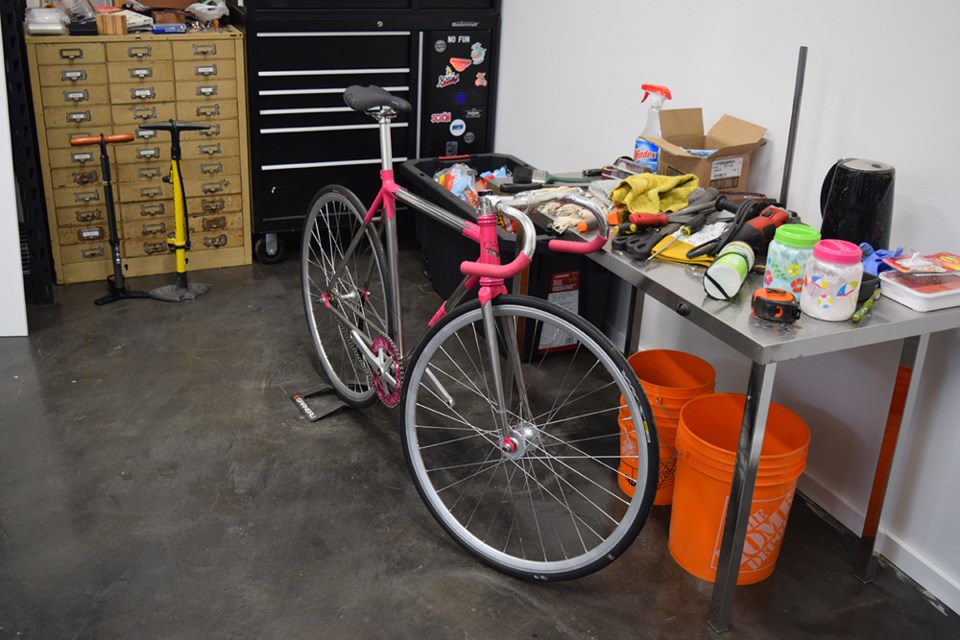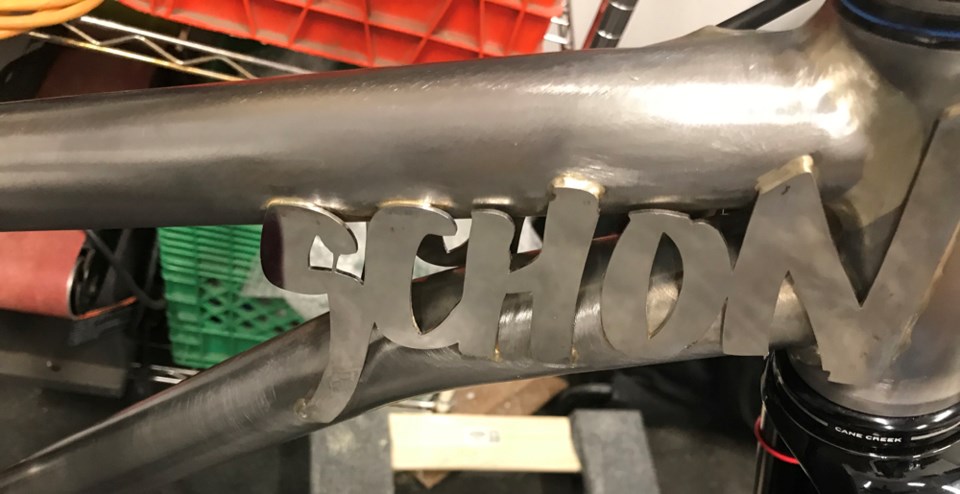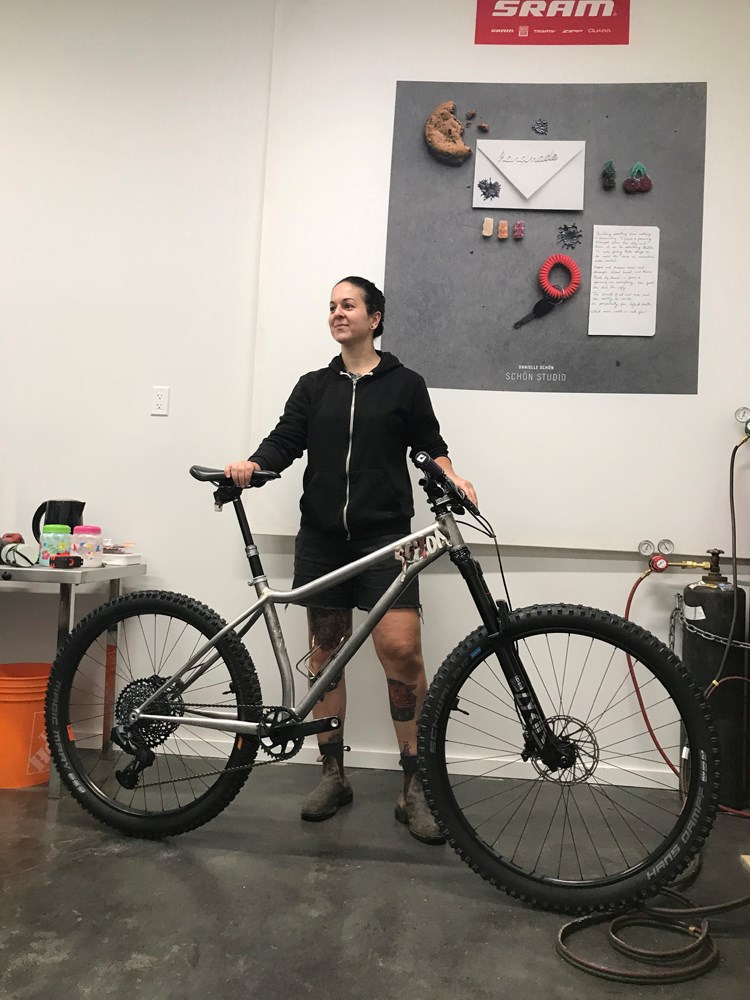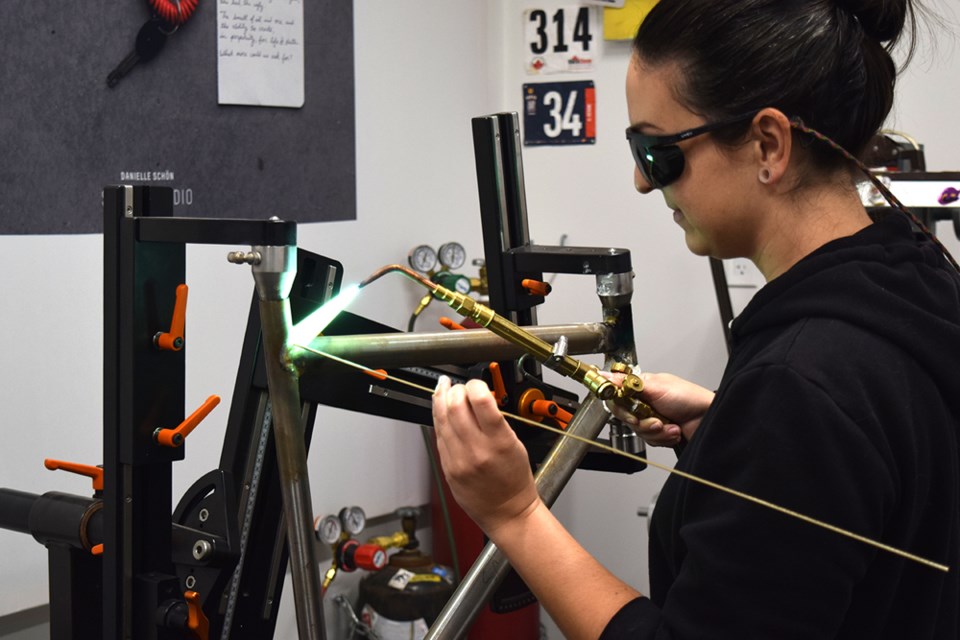The two words that come to mind to describe Danielle Schön are fierce and talented.
The Brackendale local is an accomplished welder and fabricator who is making tracks in the international hand-built bicycle world with her business, .
In one corner of her shop is a pink and silver donut-inspired track bike that is as beautiful as it is solid. In the other corner, a rugged and stylish hardtail mountain bike with unique metal detailing throughout.
The Chief caught up with the 31-year-old in her still-under-construction backyard shop just after she returned from the Philadelphia Bike Expo, where she garnered attention from the cycling magazine, for her mountain bike.
What follows is an edited version of our conversation with her.

Q: How did you end up in Squamish?
A: We moved here in March. My partner had a job transfer opportunity from Toronto. I had been out west after college and always wanted a reason to come back. I was sick of living in the city.
I told my partner I wanted to move to Squamish.
I am happy to be permanently back on the West Coast.
Q: How did you get into building bikes?
A: I have a fine arts background and then was working in a corporate, unrelated job and was really bored. So, I went back to school for welding, just out of interest as a hobby.
I did that part-time for a bit and really liked it so I ended up getting a welding diploma at George Brown College in Toronto.
I also got Non-Destructive Testing Specialist certifications [NDTs test the safety of structures and equipment] and I did some machining school as well. I just threw myself into it all.

Q: How was that journey as a woman?
A: I had a really good experience in school, which I am really grateful for because I think that dictated how willing I was to go forward with it. The instructors could tell I was serious, too, I guess. I was sometimes the only woman — there are still very few. I think that is going to change a lot in the next five or so years because there is a huge dry up in the trades as a whole generation retires.
Trades are so valuable to our society. They are part of the building blocks of who we are.
In the bike industry, it is getting better but is still very male-dominated.
There have been some weird situations along the way.
For example, very early into running my own business, I went to do a project bid at a condo site and the security guard wouldn't let me in. He said, "You are too pretty to be a welder." He wouldn't believe I was a certified welder. I didn't know how to deal with it, so I just left.
Now, I would put my foot down.
I think that stuff is always going to be there, but it is getting better because there are more people who are not women who are willing to stand up and say that it is not cool. I think that is where long-term change will come from.
��
Q: You started riding bikes in your teens, can you tell us more about your riding trajectory?
A: I started riding in the city as a college kid, just as a necessity. Then I started working as a bike messenger. Then I got into track racing — outside Toronto is the Milton Velodrome, which was built in 2014 for the 2015 Pan American Games.
I started training there and then got into road racing and then cyclocross and then mountain bikes.
The biking community is funny that way. You will have a group of bike friends who do one kind of racing and then one of them will do another type and you go and try that. Before you know it, you have 10 bikes and it is all you do.
��
Q: When did you start building and selling bikes?
A: In 2013/2014, I took a frame building course with Paul Brodie, who is actually based out of Abbotsford. He's been building handmade bikes in Canada for about 30 years. From start to finish, you build a frame. It is meant to be a hobby course not a start to launch a business, but with my artistic and metalworking background and being so into bikes, it was a perfect combination of knowledge and the things I like to do. It gives me a dynamic way to apply my skills artistically.
I built a couple of bikes and had always wanted to open some kind of creative studio. So, I opened a creative metal shop in Toronto. I have done just about everything: furniture, fixtures, store signage, a lot of fabrication for smaller artists, sculpture-type stuff, and of course custom bikes.
I make handmade lugs and stuff for the bikes. I like to have an over-arching concept and work it back into a bike.

Q: What is the biggest challenge, or something the public maybe wouldn't know about this work?
A: Definitely the amount of time that goes into it. That is something a lot of creators and maker-types all agree on. If you are doing art as a business, it is such a tricky balance; selling something and paying your bills and making a living from your creations.
Going full custom for a bike is such a whole experience for some people and then other people can't imagine why you would spend so much money on a bike.
I like to apply the bespoke suit analogy to bikes. There's nothing wrong with a suit off the store rack. But there may come a time in your life when you want a custom suit. You say, "I pick the fabrics, I pick everything — it is going to fit perfectly. The buttons are the buttons I want, exactly where I want them." That is the same with a bike. It is going to perform that specific duty perfectly because everything has been built and analyzed and designed just for you.
Find out more about Schön 's work at .
��
��������������������������




